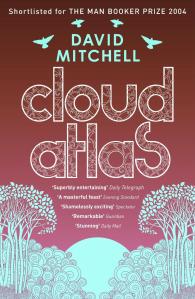 Wikipedia says that this is the author’s third book, published in 2004. It consists of six linked stories that range in time and place, from nineteenth century South Pacific to a distant, post-apocalyptic future. The novel won the British Book Awards Literary Fiction Award and the Richard & Judy Book of the Year award, and was short-listed for several others, including the 2004 Booker Prize and Arthur C. Clarke Award.
Wikipedia says that this is the author’s third book, published in 2004. It consists of six linked stories that range in time and place, from nineteenth century South Pacific to a distant, post-apocalyptic future. The novel won the British Book Awards Literary Fiction Award and the Richard & Judy Book of the Year award, and was short-listed for several others, including the 2004 Booker Prize and Arthur C. Clarke Award.
We read this in June 2015 and ten people attended the meeting, when the book provided a most enjoyably strong and lengthy discussion.
All except one enjoyed the book to a greater or lesser extent. Votes ranged from 3 to 10 with an average of 7.8 (based on ten readers).
Bill sent his thoughts by email:
Having read Cloud Atlas, twice, I have a few thoughts.To me, it’s a novel about power, the theme that links all the stories: the power of rulers over the ruled; the strong over the weak; corporations over consumers; the young over the old; the emotional over the rational and the rational over the emotional. Yet there are lots of times in the novel, which I enjoyed very much, when the individual manages to triumph over adversity and the odds.Lots of memorable characters, and wonderfully inventive writing styles.I’d give it at least an 8, if not a 9.
Maddy had to miss the meeting due to a babysitter malfunction, but she was still able to send a detailed email and an edited version is below:
I haven’t finished the book, although I am really enjoying it!!
I’m on page 363, my second visit to the future dystopia of Somni 451. The main thing I like about this section are the changes that have occurred in our language, the …ight replaced by …ite, the losing of the e from xcited and xcutive etc. the use of the brand name with lower case, the porno disneys, nikes and fordparks. I wouldn’t ever choose a book on this theme but having been ‘tricked ‘ into reading some futuristic sci-if, it’s not too bad. The themes are familiar enough though. Normally I would struggle to care about the characters in this type of setting, but I’m rooting for Somni 451!
Going right back to the beginning, I suspected that I would enjoy this book, once I had read the very first chapter, I thought it was a perfectly crafted short story, and the last line made me laugh out loud! There were lots of I words that I had to look up … Hugger-mugger, simulacrums, hawser, adzed, nonce…, I was confused by the sudden ending, as I suspect we all were.
It didn’t matter too much, and I quickly forgot that Mitchell had left us readers in the lurch as I loved the Letters from Robert Frobisher. Yes, I know they had the date on them, but his antics travelling across Europe, living lavishly on someone else’s money, the bawdy bedroom antics seemed to be more 17th century and I pictured him in a wig and frockcoat alla Casanova or Amadeus.
I really was not a fan of Half Lives. It read like those Arthur Hailey novels I discovered as a teenager and ate up, Airport, Hotel etc. Short chapters that jumped from one character to another, lots of brand names, the characters’ thoughts in italics and very dodgy scientific explanations. I couldn’t understand how it could be written by the same author, but then later, it was revealed as an unpublished manuscript by an unknown writer, so of course it was deliberately cheesy!
Loved, loved, loved The Ghastly Ordeal of Timothy Cavendish… Lots of LOL lines. Newspaper columnists as ‘an aviary of vultures and tits’ Felix Finches Final Fling, ‘expired in an ending flat and inane quite beyond belief’ ‘a wealthy and widowed poetess who transpired to be less widowed than originally claimed’ a quote that I thought was particularly relevant to us was when he was bemoaning his career in publishing:
‘why have you given your life to books TC? ..all that ruddy fiction. Hero goes on a journey, stranger comes to town, someone wants something, they get it, they don’t, will is pitted against will. Admire me, for I am a metaphor.’Sloosha’s Crossin’ like most fiction with lots of apostrophes was hard goin’ to start, but once you cogged the language twasn’t ‘spesh difficult…tho’ questions are mozzin’ me plaguesome about what it all means… Why are all these different stories in the same book? The links where someone was reading someone else’s story were very contrived and awkward. There was a good passage where Meronym explains to Zachry the difference between Civilised and Savages p318, and I think this could be a theme running through the novel. I haven’t finished it yet, so it may become more apparent, and I look forward to hearing what everyone else thinks.
Our own cloud atlas
To embrace the “separate yet joined” nature of the book, those at the meeting also added their thoughts to a visual representation of the book (see image below). Each cloud around the periphery represents one of the stories, whilst the cloud in the centre is the book as a whole. Each reader was asked to add one word or a short phrase to each cloud, to sum up the nature of that story, or what they felt about it. Click on the image for a larger picture.


You must be logged in to post a comment.